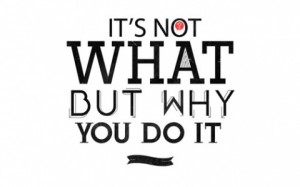Why Do They Do What They Do?

Years ago, I was stuck in a conflict with a colleague. As often happens with conflict, both of us thought we were in the right. Looking back, we were probably both right on some issues, and in the wrong on others. But at the time, both of us chose to stand our ground and not give in to the other. This lead to an impasse.
So, I sought the advice of one of my mentors. I laid out the facts, the situation, my position, the position of the other party, the things I had said, the things the other party had said, and any other information that I thought would give my advisor a clear picture. (Or, perhaps more accurately, I gave him information in the hopes he would land on “my side”.) After my information dump, and a few follow up questions, he paused, and looked up at the ceiling. I could tell he was thinking and processing. I knew that when he finally spoke, he’d give me the ammunition I needed to finally win the argument. After what seemed like forever, he finally looked down, focused on me and asked, “Why do you think he does what he does?”.
Huh?
What kind of question is that? I wanted answers, not questions. I wanted leverage, and proof points. The last thing I wanted to do was think of the other person. After all, I wanted to be right.
Alas, I gave in and started pondering the question. The discussion that followed gave me a perspective, and a new way of looking at things that had never occurred to me before.
Since that conversation so long ago, I have come to learn that whether I am dealing with a market segment, a prospective customer, a colleague, an employee or any relationship for that matter, the question “Why Do They Do What They Do?” is probably one of the most insightful questions we can ever ask. There’s a logical progression that we can follow to answer this question, and better understand someone’s actions. If we are willing to check our egos at the door, and walk through this progression, it’s amazing what we can uncover.
So, what’s the answer to the question “Why Do They Do What They Do?”? In short, the answer is “Experience”. Let me explain.
Too often, we have a conflict or observe a behavior, and we want to address the behavior (what they did, what they said, etc.). However, there is a “reverse waterfall” effect that underlies most behavior. It goes something like this…
- Behavior (what we do, what we say) often is the result of how we feel (our emotions)
- Emotions (how we feel) are often driven by what we think to be true (whether it’s actually true or not). These are our beliefs.
- Beliefs are shaped by our experiences, and how they affect us
- Experience, then, serves at the core for understanding the answer to the question.
Let me give an example of how this plays out in the day-to-day.
I once had a conversation with an executive who told me about a staff member who was really high strung. At first, this was hard to detect because this staff member was incredibly efficient, always meeting (and even exceeding expectations), and going out of her way to make sure that everyone else on the team had what they needed. But over time, “stress cracks” started to develop. The executive said that managing this staff member had become a challenge.
So, like my mentor did that day, I in turn asked “Why do you think she’s acting this way?” The executive further discussed the staff member’s behavior, which was a high intensity, “get it done for everyone else” mode. I then asked questions about how she felt (emotion) about her team, her job, the company, her value, etc. The executive said that, within the team, the staff member felt like “low man on the totem pole”, even though her position on the org chart was in line with everyone else. So, then I asked about what this employee thought to be true (belief) about her role, her position, and her status. The executive stated emphatically that the staff member believed that she brought very little value, that she felt she needed to prove herself, and that if she helped everyone else, she would be accepted. Finally, I asked, “Where do you think this belief of ‘I’m of little value’ comes from?” It was at this point the lightbulb went on in the executive’s mind. The executive went on to say that from what little was known of the staff member’s personal life, it had been rough. I remember the executive said, “Many key relationships in her life have done nothing but tell her that she’s no good. I didn’t even think about how that correlates to her behavior at work”.
It was revelatory. This executive, with this new insight, began approaching and coaching her employee in a new way. She made sure to affirm her regularly, and to help her see her value because of who she was as a person, not just because of what she does. This new approach helped the employee “settle down”, lower her stress, and become even more productive.
We live in a world where we’re told to “deal with conflict” or “handle people”. And for some, that may seem to work. But it’s a false, failed approach to responding to the struggles we face each day in effectively communicating with people. If you want to reach your market, improve employee effectiveness, help your customers, or enhance any of your professional or personal relationships, then start with asking a simple question: “Why Do They Do What They Do?”. And when you seek the specific answers, do so with a desire to help them before yourself. I think you’ll be amazed at the outcomes.
